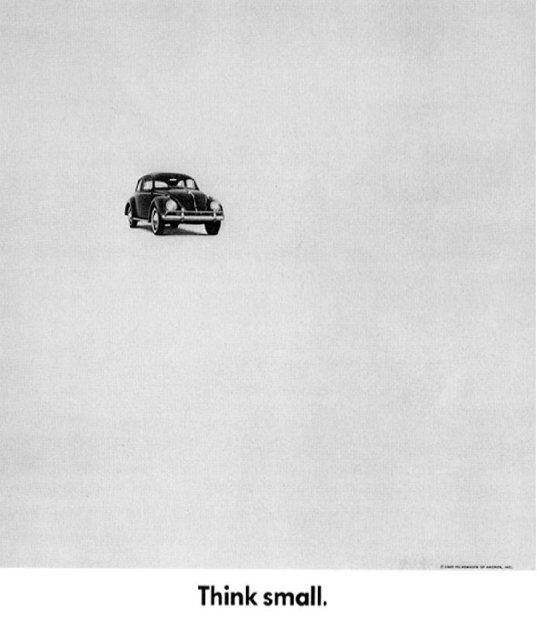An Excerpt from 'Mad Men Unbuttoned': Selling the "Nazi Car" to the Jews
by Natasha Vargas-Cooper

In advance of the new season of Mad Men starting this weekend, today Mad Men Unbuttoned is released
! Written by your friend and mine, Natasha Vargas-Cooper, the book launches way out from her cultural exploration project, The Footnotes of Mad Men. Here’s a little chapter on some history of advertising in the period of Mad Men, from Doyle, Dane, and Bernbach, the real-world firm that haunts the halls of TV’s Sterling Cooper.
West Germany v. Detroit: The Volkswagen Campaign
It was a “Nazi car” repackaged by a Jewish-owned advertising agency and sold as an underdog option to the bloated cars out of Detroit. It became a symbol of consumer counterculture. It was ugly, it was cramped and it was named after a bug.
“But we learned that Hitler’s ‘people’s car’ had a lot going for it,” George Lois wrote after returning from Volkswagen’s factory in Wolfsburg, Germany, with copywriter Julian Koenig. “Julian saw it as a dumb, honest, little car-but a marketing enigma. New York was our biggest market for our new account, and that’s what made it so tough.”
If David Ogilvy exploited the class aspirations of consumers to get them to spend money, and Leo Burnett’s campaigns spoke in a lingua franca so that products reflected American sensibilities, then Bill Bernbach’s greatest-some hail it as the greatest-contribution to advertising’s creative revolution was counterintuitive marketing. Bernbach took the perceived disadvantages of a product and turned them into their most desirable aspect. With the Beetle, Bernbach position the little car as a revolt against American excess. The vulgar Detroit cars were oversized, larded with unnecessary accents that increased their prices (fins, chrome, etc.) and every few years you would have to buy another to stay current.
Koenig’s copy acknowledged the Beetle was homely, squat, and had been derisively referred to as a lemon, but argued that the compact car’s lack of flare was because German car inspectors-3,389, to be exact-spent more time perfecting an efficient product than adding frippery to a car that could only depreciate over time.
Thanks almost entirely to the campaign, sales went up to 500,000 a year.
Bernbach’s (and his disciples’) ability to challenge consumers’ beliefs about a product while simultaneously enticing them to buy it distinguishes him as one of the most influential forces of modern advertising.
“Now I’m not talking about tricking people,” Bernbach said. “If you get attention by a trick, how can people like you for it? For instance, you are not right if, in your ad, you stand a man on his head just to get attention. But you are right to have him on his head to show how your product keeps things from falling out of his pockets.”
Lois summed up the legendary campaign this way: “We sold the Nazi car in a Jewish town by junking all the rules of car advertising. It could have only happened at Bill Bernbach’s agency.”
Penthouse called it “a dazzling pop-culture history of the 1960s”! What more could you want? Also: it features contributions by Awlers Matthew Gallaway, Alex Balk and more!
